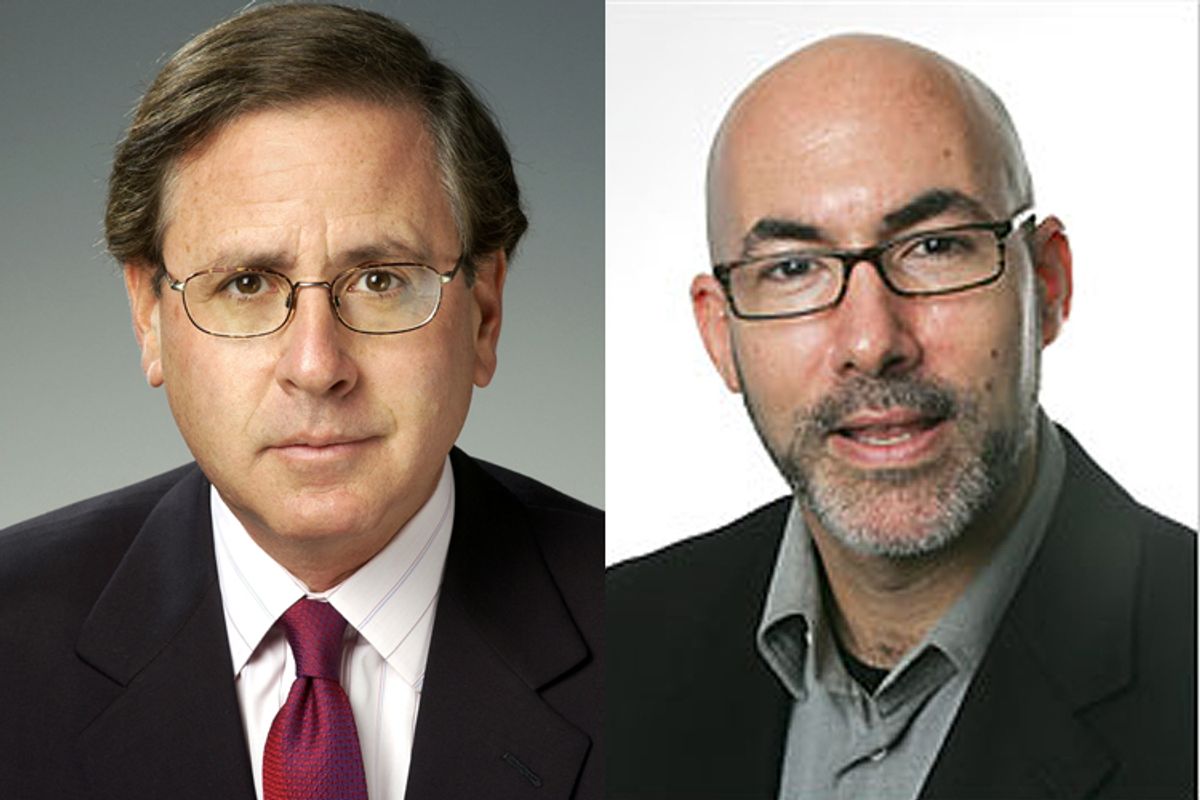Back in the Internet bubble days of the late 1990s, lots of journalists decamped from traditional news organizations to start or join dot-com companies. The early few were the real pioneers; as the decade wore on the people who bailed out of mainstream news organizations -- which were doing well financially at the time but didn't offer stock options except to a tiny number of senior people -- were folks who in many cases saw a gravy train and decided to jump on it.
The bubble burst. Some of the early venturers, such as Gawker's Nick Denton, who'd already done several startups before launching his blog network, stayed the course and prospered. But I'd bet that most of the journalists who'd bailed out decided that the comfortable embrace of a financially solid enterprise felt better than the high-risk territory of the startup.
This is background to a new and I believe more lasting movement we're seeing from traditional media to new media (which is rapidly becoming old media in its own right). In the last few days, the Huffington Post hired two extremely prominent journalists from East Coast mainstays: Newsweek's Howard Fineman, a political writer and columnist who's probably better known for his TV appearances, and the New York Times' Peter Goodman, a star of sorts in the economic reporting world. Meanwhile, Yahoo News hired Phil Pruitt, USA Today's deputy managing editor, to run its politics section. A lot of this has been going on in the past several years, but this week feels like one of those times when the ground may actually be shifting under our feet in the media ecosystem. Why so?
Goodman told the Washington Post's Howard Kurtz (scoop for the old guard!) that writing in the Times' news pages was "almost a process of laundering my own views, through the tried-and-true technique of dinging someone at some think tank to say what you want to tell the reader." This prompted NYU professor and media critic Jay Rosen, who's helped define a major problem with traditional media's washing of actual voice and even honest reporting out of journalism, to tweet:
You get what this means, right? The View from Nowhere has become a liability in keeping newsroom talent
Scott Rosenberg, writing in his Wordyard blog and here on Salon, refined the implications today with a smart posting, expressing sympathy for the traditional media's wish to offer an impartial take on the news. But his key insight is that the opportunity for old and new media people these days is to use actual human voice, amid much experimentation with journalistic forms, to bring valuable information to people who want something they can trust.
I'm also convinced that a big part of what's happening is a sound one from a journalistic sense: That is, reporters want to be liberated from the lazy-journalism tyranny of the idiotic notion that there are two equal sides to everything -- do a story on the Holocaust, get a quote from a neo-Nazi -- and they grasp better than their old-media editors do that human voice is the heart of story-telling. When the Washingon Post tells its journalists to hide all human-ness from their public utterances, it's missing an important part of our future.
But the larger trend, the one that isn't about superstar journalists, is the secular economic trend: The traditional media are in big trouble and the media companies with money to spend are online. Watching AOL and Yahoo hire journalists is heartening; they see the opening, they don't have the same cost structures (e.g. printing presses and distribution) and they suspect there's an actual business in providing people useful information.
What we don't know yet is the staying power of the new-media giants, much less startups. Yahoo and AOL, no less beholden to shareholders than the traditional organizations that have whacked their staffs in recent years, have low or zero insitutional tradition of quality journalism; if these media ventures don't move the financial needle, they'll be killed without mercy by the beancounters.
The traditional news industry forced this round of departures. Lots of the people who've moved into new kinds of media took buyouts. Some were laid off in the carnage that media organizations have created in their ranks these past few years. You're hearing only about the famous ones, but this is a much, much wider trend.
And, vitally, online media companies aren't the only ones hiring the journalists. Many more top reporters and editors are jumping to PR firms and think tanks and NGOs than ever before.
PR isn't journalism, but it's getting more social, and smarter PR people realize that they, too, have a stake in showing some integrity. Think tanks and NGOs increasingly are filling a journalistic role. This is not well enough appreciated by news media or consumers, but it's a valuable part of the emerging information ecosystem.
Meanwhile, we're seeeing a blizzard of startups with news potential; while few of them are hiring traditional journalists -- most older journalists just don't grasp what they're trying to do -- they are my major hope for the future once they realize that quality is going to matter to audiences that are growing desperate to find things they can trust.
The ecosystem is growing vastly more diverse. That's the enormously good news.

Shares